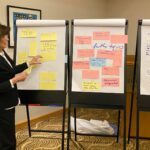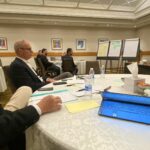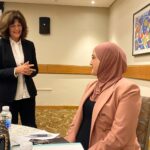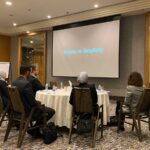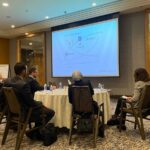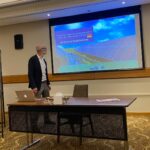
Sharing knowledge is caring for the climate: The EMA led a group of experts from the construction industry to Amman, Jordan, where they successfully engaged in workshops to tackle questions of the promotion of sustainable building and green infrastructure.
We need to share our knowledge across sectors and develop ideas to create a sustainable future. Therefore, Jordanian and German architects, urban planners, sustainability experts, small and medium-sized construction companies, as well as representatives of local authorities and municipalities came together to discuss and explore innovative ways of fighting the climate crisis. They were guided through the complex topics by the coaches Eng. Matthias Pfeifer, Eng. Ute Pfeifer, Eng. Michael Schenker, and Bernhard Werheit.
Solutions in the construction industry are manifold: the use of renewable and new raw materials, BMI and 3D printing, energy efficiency and sustainable water management, as well as the further development of existing job profiles in the construction industry, can meet the requirements of digitalisation and climate change. We are excited to enable an intercultural exchange about these issues and hope for continued cooperation in this sector.
This workshop series was funded by the Minister for Federal, European, and International Affairs, as well as for Media of the State of North Rhine-Westphalia. Thank you and all coaches as well as the participants for these successful days in Amman.
Day 1: Sunday, December 11, 2022
|
9.30 A.M. |
Entrance with Networking Coffee
|
|
10.00 A.M. |
Words of Welcome Dr. Abdelmajid Layadi, Vice President, EMA
|
|
10.05 A.M. |
Introduction Moderation: Eng. Ute Pfeifer, Coach, PfeiferINTERCOACH & Member of the Executive Board, EMA
|
|
10.30 A.M. |
Workshop I “Sustainability Begins with Planning” Eng. Matthias Pfeifer, Senior Partner, Managing Director, RKW Architektur +, Düsseldorf
|
|
12.30 P.M.
|
Lunch Break |
|
1.30 P.M. |
Workshop I (cont’d) Practical examples of sustainable architecture in Amman Eng. Matthias Pfeifer, Senior Partner, Managing Director, RKW Architektur +, Düsseldorf
|
|
3.00 P.M. |
Networking Coffee
|
|
3.45 P.M. |
Walking Tour Practical examples of sustainable architecture in Amman (cont’d) Eng. Matthias Pfeifer, Senior Partner, Managing Director, RKW Architektur +, Düsseldorf
|
Day 2: Monday, December 12, 2022
|
9.00 A.M. |
Entrance with Networking Coffee
|
|
9.30 A.M |
Workshop II “Mapping the Field: Documenting Status Quo, Formulating Needs, Setting Achievable Goals” Ute Pfeifer, Coach, PfeiferINTERCOACH & Member of the Executive Board, EMA
|
|
11.00 A.M. |
Workshop III “Water & Waste Water Management with Innovative Underground Engineering” Eng. Michael Schenker, Director Business Development, bauku extrusion technology UG, Lindlar
|
|
12.30 P.M.
|
Lunch Break
|
|
1.30 P.M. |
Workshop IV “Solar Technology for Achieving Energy Efficiency & Carbon Neutrality” Bernhard Werheit, Managing Director, WERHEIT Metallbau Verwaltungs GmbH & Co. KG, Cologne
|
|
3:00 P.M. |
Official Closing with Networking Coffee
|
Workshops on the Promotion of Sustainable Building and Green Infrastructure between North Rhine-Westphalia and Jordan: Amman | December 11-12, 2022
On December 11 and 12, 2022, presence workshops on sustainability and sustainable building were held in Jordan’s capital Amman. The aim of the workshops was the further development of Jordanian know-how by experts from North Rhine-Westphalia (know-how transfer) as well as the exchange of experience and the networking of stakeholders in the construction industry. The workshops were designed as qualification offers for the Jordanian middle management in the field of sustainable construction and green infrastructure.
The target group included architects, urban planners, sustainability experts and small and medium-sized construction companies, as well as representatives of local authorities and municipalities and trainers in local training centers for the building trade. Almost 30 people took part in the workshops: multipliers from the Vocational Training Corporation (VTC), the Jordan Green Building Council, the Iraq Green Building Team, and various universities and municipalities.
As an expert in sustainable planning and building and a coach, EMA board member Ute Pfeifer first succeeded in establishing common ground for all participants on the topic of sustainability in the planning context on both workshop days. According to her, building material manufacturers, planners and construction companies all over the world have a greater responsibility than ever to develop sustainable design concepts and to realize environmentally friendly buildings. Experts from different disciplines in science, industry and building practice are needed for the important international exchange.
The first practice-oriented step logically involved documenting current building practice as a starting point, formulating needs and requirements, defining achievable interim goals, and developing and implementing work packages so that defined main goals could be achieved.
Following on from this, in his workshop on Day 1, architect and green building expert Matthias Pfeifer threw architectural, urban planning and building materials spotlights on the subject of sustainability in the construction industry. His reflections were flanked by an extensive walk through the neighborhood of the event center, during which Mr. Pfeifer explained the theoretically elaborated aspects around sustainable planning and building with practical examples.
With Michael Schenker and Bernhard Werheit, EMA was also able to win over two North Rhine-Westphalian entrepreneurs and experts on the practice of sustainable construction. With their presentations on water management and solar technology systems, they pointed out the practical implementation possibilities of urban and building planning in their hands-on workshops on Day 2.
The workshops received consistently positive feedback from participants. Together, they formulated the following expectations that should play a role in their future work. These include soft topics such as increased learning about the possibilities of green building, a more steady exchange with like-minded people, and the formation of an awareness of how to deal with sustainable planning and building. However, concrete work items such as the refurbishment of existing buildings, improved water and wastewater management (Gray Water), and dealing with refugees, which plays an important role in Jordan, were also addressed.

